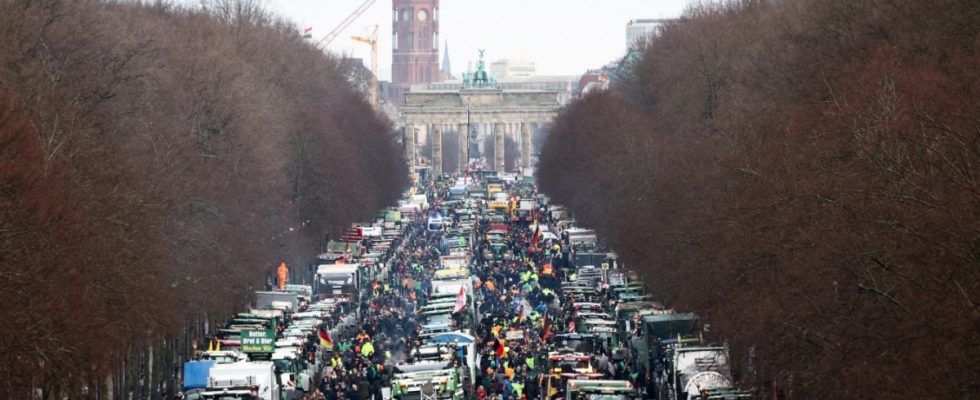At the large demonstration by thousands of farmers against the federal government’s austerity measures in Berlin on Monday, farmers threatened a tough fight against the imposed burdens. “Withdraw the tax increase proposals, then we will withdraw,” demanded farmers’ president Joachim Rukwied at a rally in front of the Brandenburg Gate. The demonstration sends a signal to the entire country. The compromise offered by the government so far is not fair, but rather lazy, said Rukwied. “We won’t accept that.” Tractors and trucks had largely paralyzed traffic in the government district.
The coalition factions in the Bundestag want to persuade the federal government to do more for the farmers. The SPD, Greens and FDP are preparing a joint motion for a resolution that is to be passed this week. However, the traffic light parties apparently do not intend to meet the farmers’ core demand and withdraw the planned reduction in tax breaks for agricultural diesel. This became clear after a conversation between the parliamentary group leaders of the traffic light parties on Monday and representatives of farmers’ associations.
Farmers President Rukwied then criticized the talks so far without any results. Agricultural diesel must remain tax-free and plans for cuts must be “off the table,” he emphasized. Solutions are now expected from the adjustment meeting of the Bundestag’s budget committee this Thursday, in which the federal budget for the current year is to be finalized. Only then could there be a discussion about other suggestions. The traffic light factions want to reduce farmers’ dependence on trade in order to strengthen their market power, it was said on Monday with a view to the planned application. The aim is to ensure that more money stays in the companies, said Green Party leader Britta Haßelmann. However, the details of the motion for a resolution are still being worked on and will be introduced in the Bundestag on Thursday.
Revenue should increase – but not through subsidies
A rethink is also underway in the federal government. Agriculture Minister Cem Özdemir (Greens) had already signaled his willingness to increase aid for the animal-friendly conversion of stables and, in return, to introduce a tax or levy on meat and animal products – the animal welfare levy that has been planned for some time. Chancellor Olaf Scholz (SPD) is also apparently ready to make further concessions that will increase farmers’ income. The companies are now subsidized by 40 percent, said government spokesman Steffen Hebestreit. We have to find ways to at least not let this proportion increase. “These conversations start now.”
However, Rukwied countered that the discussions with politicians primarily discussed things that “we have been discussing for 30 years without results.” He hopes that in the next few days there will be “a solution that agriculture can also support” and called on farmers to refrain from further blockades and protests until the budget negotiations are concluded. As a compromise, the rural agriculture working group suggested sticking to diesel subsidies only for small businesses. It would be conceivable, for example, to forego cuts up to a consumption of 10,000 liters of diesel per year, said chairman Josef Schmid.
Christian Lindner during his appearance at the farmers’ demonstration. Left in the picture: Joachim Rukwied.
(Photo: Michele Tantussi/Getty Images)
Federal Finance Minister Christian Lindner, on the other hand, announced that he would remain tough on agricultural diesel. “I can’t promise you any more state aid from the federal budget today,” the FDP chairman said to the demonstrators. He was loudly insulted and whistled at. Lindner announced that there could be more freedom for companies and less bureaucracy. It is also the right time to talk about the high environmental standards for farmers and the mandatory set-asides. It is also conceivable that companies’ fluctuating profits could be better taken into account in income tax.
Farmers are taking to the barricades against cuts in financial aid for businesses that are intended to plug gaps in the 2024 budget. The traffic light tips had already partially met them recently. The subsidies for agricultural diesel should not be eliminated in one fell swoop in the short term, but gradually over three years. The traffic light has already cashed in on the originally planned abolition of vehicle tax exemptions in agriculture. Bavaria’s Prime Minister Markus Söder (CSU) called for an agricultural summit in the Chancellery. Scholz must invite agriculture and conclude a “future contract”.

